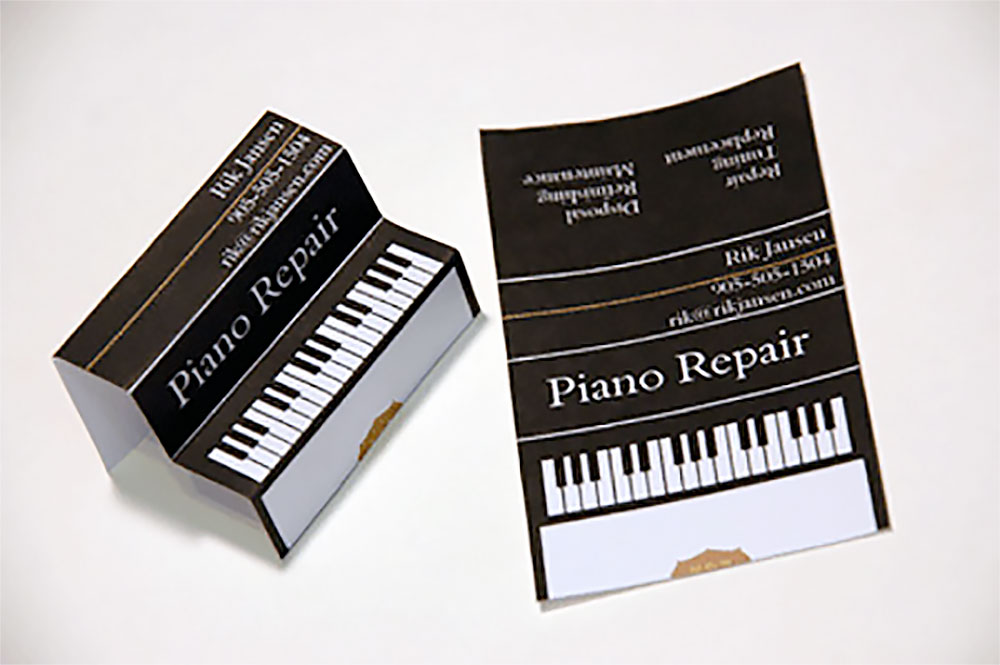
If you’re a piano teacher or a professional pianist looking to promote your services, having a well-designed business card can be a valuable marketing tool. In the digital age, where everything seems to be online, business cards may appear outdated, but they still play a crucial role in making personal connections and leaving a lasting impression. A creatively designed piano business card can convey your expertise, professionalism, and passion for music to potential clients or collaborators. In this article, we will explore the importance of piano business cards and provide some tips on how you can create an effective and memorable one.
Why Piano Business Cards Still Matter

With the rise of technology, you might wonder if traditional business cards are still relevant. The truth is, even in today’s digital world, business cards continue to hold value. They offer a tangible and personal touch that is hard to replicate online. When you meet someone at a music event or concert, handing them a business card ensures that they have a physical reminder of your contact information. It’s a much more practical option than fumbling around with your phone to input details.
Making a Lasting Impression
A well-designed piano business card can leave a lasting impression on potential clients. It allows you to showcase your unique style and professionalism right from the start. The visual appeal of your card can reflect your personality and musical aesthetic, giving people a glimpse into your talents and approach to music. A beautifully designed business card can also act as a conversation starter, sparking interest in your musical abilities and encouraging further contact.
Easy Sharing and Increased Reach
Another significant benefit of having piano business cards is the ease with which they can be shared. When networking with fellow musicians, teachers, or potential clients, having a stack of business cards readily available is an efficient way to exchange contact information. Beyond in-person encounters, business cards can also be left at local music stores, cafes, and other relevant venues, thereby extending your reach to a wider audience.
Establishing Professionalism and Credibility
Presenting yourself as a professional is crucial in the music industry. When you hand out a well-designed business card, it demonstrates that you take yourself seriously and are committed to your craft. The aesthetics, quality, and attention to detail in your card show potential clients that you are dedicated to excellence. Additionally, having a physical business card distinguishes you from those who rely solely on digital means of communication, positioning you as someone who values personal connections and makes an effort to stand out.
Creating an Effective Piano Business Card

Now that we’ve established the importance of piano business cards, let’s dive into some tips for creating an effective and memorable card:
1. Choose a Distinctive Design
The design of your business card should be visually appealing, relevant to music, and reflective of your personal style. Consider incorporating elements like piano keys, musical notes, or elegant musical symbols to make your card stand out. Use colors that complement your style, but be sure to maintain a professional appearance. Avoid overcrowding the card with excessive information or design elements, as simplicity can often be more impactful.
2. Use High-Quality Materials
Investing in high-quality materials for your piano business cards will ensure that they make a lasting impression. Thick, durable cardstock with a glossy or matte finish can add a touch of elegance to your card. A well-designed card on quality paper sends a message that you value quality in every aspect of your work.
3. Include Relevant Information
When designing your piano business card, include essential information such as your name, contact number, email address, and website (if applicable). If you teach piano, you may want to specify the age range or skill level you cater to. It might also be helpful to highlight any certifications or specific accomplishments that showcase your expertise and make you stand out in a competitive market.
4. Showcase Your Musical Brand
Your piano business card is an opportunity to showcase your personal brand. Consider incorporating a memorable tagline or a short statement that captures your musical philosophy or style. This will help potential clients or collaborators get a clearer idea of your musical identity and what sets you apart.
5. Utilize Both Sides of the Card
Make the most of the available space by using both sides of your piano business card. The front could feature your name, logo, and contact details, while the back could include a brief bio, testimonials from satisfied clients, or even a QR code that directs people to your website or social media profiles. Utilizing both sides allows you to provide more information without cluttering the card.
6. Maintain a Consistent Branding
Consistency is key when it comes to branding. Ensure that your piano business card aligns with your other marketing materials, such as your website, social media profiles, and promotional materials. This includes using consistent fonts, colors, and design elements. Maintaining a cohesive brand identity will help potential clients recognize you and reinforce your professionalism and attention to detail.
Conclusion
In the digital age, where online presence dominates, piano business cards might seem like relics from the past. However, their tangible nature and personal touch continue to make them valuable marketing tools. A well-designed piano business card allows you to showcase your musical expertise, professionalism, and passion to potential clients or collaborators. By choosing a distinctive design, using high-quality materials, and incorporating relevant information, you can create a memorable card that leaves a lasting impression. So, don’t underestimate the power of the piano business card in promoting your musical services â_x0080__x0093_ it may just be the key to unlocking success in the music industry.
Olivia Reynolds, a marketing maven, is passionate about the impact of graphic design on brand success. Her love for outdoor adventures and travel fuels her fresh perspective on the importance of visual aesthetics in business cards and branding.